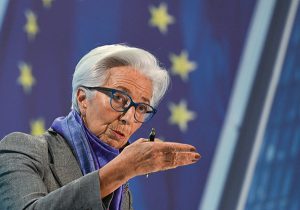Bloomberg
Passing the peak in European inflation may be good news for consumers, businesses and central bankers, but it’s too soon to sound the all clear.
Reports have shown price gains from Germany to Spain easing more than economists expected in December after natural-gas costs retreated and government aid kicked in.
Those falls, however, mask intensifying pressure in gauges that exclude things like energy and food — precisely what the European Central Bank tracks to determine how much to raise borrowing costs.
Like in the US, where the Federal Reserve remains hawkish despite five months of slowing inflation, that makes a shift in the ECB’s immediate policy plans unlikely.
President Christine Lagarde has already pledged another half-point interest-rate hike next month — “and possibly at the one after that†— building on 250 basis points of advances since July.
The latest ECB projections show inflation won’t reach the 2% target until late-2025. Updated forecasts won’t be available until March.
“Peak inflation may be behind us indeed,†but “the issue is the stickiness of the underlying inflation,†said Piet Christiansen, chief strategist at Danske Bank A/S. “Therefore, the February decision is set in stone.â€
Following a distinctly combative tone at the ECB’s December meeting, economists have raised their forecasts and widely expect the two 50 basis-point steps that have been flagged.
Traders are betting on a similar outcome, though they trimmed their prediction for where rates will settle after weaker-than-anticipated inflation data from Spain.
Prices in the euro zone’s fourth-largest economy rose by 5.6% from a year ago in December — down from 6.7% the previous month.
Inflation rates also declined in Portugal, Germany and France. Data for the euro zone, which welcomed Croatia as its 20th member, are due on Friday. Analysts predict a second straight slowdown to 9.5%.
Uncertainty around inflation remains elevated. Higher wholesale energy costs following Russia’s invasion of Ukraine haven’t yet reached all euro-area households, with many adjustments coming at the start of the year.
Food prices are also likely to climb further, while it’s unclear how relief measures in countries like Germany, which has capped gas and electricity prices, will impact headline inflation rates.
“Inflation data at the moment are volatile,†Holger Schmieding, chief economist at Berenberg, told Bloomberg TV.
“The ECB is determined to bring inflation down much more.â€
It’s a message Lagarde has delivered herself, anticipating the focus on the main inflation figure.
“We cannot be fixated on one single number,†she said, citing “good reasons to believe†inflation will pick up again in January.
“We have to look at a trend, we have to look at the inflation outlook, we have to consider what has been achieved, and certainly where we want to go,†Lagarde said. “We have longer to go, and we are in for a long game.â€
 The Gulf Time Newspaper One of the finest business newspapers in the UAE brought to you by our professional writers and editors.
The Gulf Time Newspaper One of the finest business newspapers in the UAE brought to you by our professional writers and editors.
